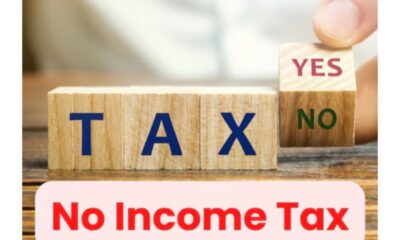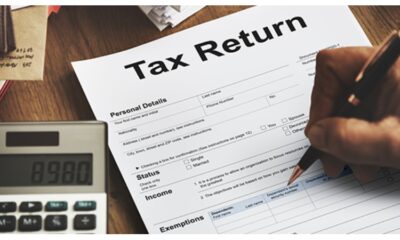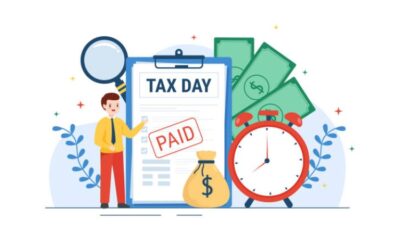Business
What Effects Does Working From Home Have on Taxes?

Have you worked from home this year, or did you work from home in 2023?
Although many Canadian businesses have started to reinstate in-office work regulations, a sizable portion of the workforce still works from home as independent contractors, employees, or small business owners.
There are certain advantages and bonuses to working from home, such as the chance to complete housekeeping or work in your jammies while taking business calls. It may, however, alter how you submit your tax returns. Here’s a brief overview of what to expect.
Various Circumstances For Working From Home and Taxes
About 20% of Canadians were still working from home as of November 2023, down from 40% in April 2020 and 30% in January 2022, when the epidemic was at its worst.
For several businesses, the work-from-home approach proved beneficial as it enabled them to reduce their office space and establish a more streamlined operational framework. Some businesses discovered that by requiring workers to work in a central office, if not full-time then at least part-time, using a hybrid company model, they were able to run more efficiently.
Employees Who Work From Home
Those who work from home as employees face different tax ramifications than those who operate from home as independent contractors or small business owners. Workers who do business from home may be eligible to claim a deduction for some of their home office costs, including:
- Electricity
Internet and data
Cartridges for printer ink and toner
Pens, paper, and additional office materials
Commission-based workers and salaried workers are treated differently by the CRA. The CRA allows commissioned employees to deduct additional expenses such house insurance, property taxes, and consumer electronics leases because they typically have less stable incomes.
Small Company Owners and Independent Contractors
Independent contractors, sometimes known as freelancers, work for many employers. They may decide to work for a single customer or company, but their taxes are not the same as those of a regular wage earner. The same holds true for home-based small business entrepreneurs.
Unlike employees, self-employed contractors do not often have their taxes deducted from their paychecks when they get paid. On the other hand, independent contractors must file their taxes on a quarterly or annual basis.
To help them remain on top of their taxes, many self-employed independent contractors and business owners collaborate with a bookkeeper or accountant. This takes a little more organization and dedication.
Small business owners and self-employed independent contractors who make more than $30,000 in revenue in a quarter, or over four consecutive quarters, are also required to register for GST/HST.
Self-employed people have greater financial obligations than employees, but they can also deduct a greater range of expenses from their taxes, including:
- Taxes on real estate
- Interest on a mortgage
- Allowance for capital costs
- utilities (heat, power, and internet)
- Supplies and equipment for a home office (laptop, pens, paper, etc.)
Common Mistakes To Stay Away From
To simplify tax filing and ensure compliance with the Canada Revenue Agency’s tax laws and regulations, steer clear of these typical errors.
Overstatement of Costs
Overclaiming expenditures and deductions is the most frequent error made by independent contractors, small business owners, and workers from home. Regulations from the CRA specify just how much of your taxes you can deduct.
For instance, if you use your home office exclusively for business purposes, you are not eligible to deduct the whole cost of your mortgage or your electricity bill.
To assert deductions in accordance with CRA standards, you will need to compute the percentage of your housing expenditures (based on the square footage) that is utilized by your home office for work or business income.
Disorganized Documents
Maintaining organization is one of the easiest methods to make preparing your quarterly or annual tax returns simpler. Hold onto all of your papers, invoices that have been paid, receipts, and other necessary documents.
When to Seek Assistance
Whether you run a small business, are an independent contractor, or are an employee, it can be challenging to keep track of your home office expenses. This is particularly valid for small business owners that run their operations out of their homes.
Maintaining an organized filing system and keeping track of all of your receipts, costs, and income is the best course of action.
Don’t be hesitant to ask for assistance from a tax professional if you are having trouble filing your own taxes at the end of the year. The headache and possible fines they may spare you from are sometimes more than worth the tiny fee you’ll pay them to assist you in staying on top of your taxes.
-

 Sports4 weeks ago
Sports4 weeks agoFIFA Club World Cup 2025: Complete List of Qualified Teams and Groups
-

 Sports2 weeks ago
Sports2 weeks agoAl Ahly vs Inter Miami, 2025 FIFA Club World Cup – Preview, Prediction, Predicted Lineups and How to Watch
-
Health1 week ago
Back to Roots: Ayurveda Offers Natural Cure for Common Hair Woes
-
World4 weeks ago
Omar Benjelloun: Strategic Architect Behind Major Financial Deals in the MENA Region
-

 Sports3 weeks ago
Sports3 weeks agoFIVB Men’s Volleyball Nations League 2025: Full Schedule, Fixtures, Format, Teams, Pools and How to Watch
-

 Tech1 week ago
Tech1 week agoFrom Soil to Silicon: The Rise of Agriculture AI and Drone Innovations in 2025
-

 Startup2 weeks ago
Startup2 weeks agoHow Instagram Is Driving Global Social Media Marketing Trends
-

 Science4 weeks ago
Science4 weeks agoEverything You Need to Know about Skywatching in June 2025: Full Moon, New Moon, Arietid Meteors, and Planetary Marvels

























